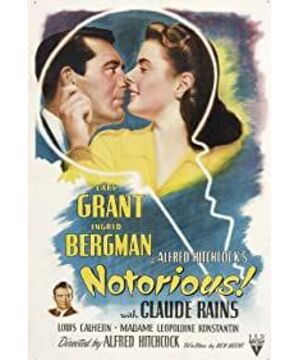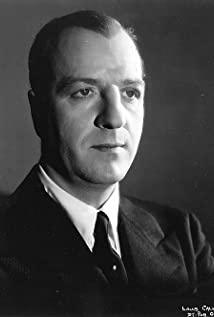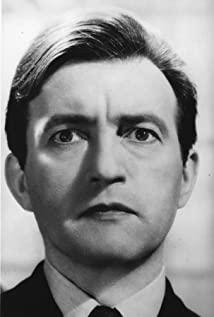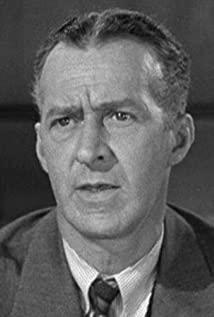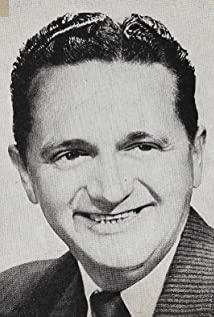Yet let us recall the final scene of Notorious (1946): Devlin elopes with the poisoned Alicia from Sebastian's house in full view of the latter's Nazi collaborators. What we have here is a homologous underlying structure of the three gazes, of the three subjective positions : the ignorant Other is here the members of the Nazi ring who do not know that Alicia is an American spy and that Sebastian knows it (the reason why he is slowly poisoning her with his mother's help); the actants are Devlin and Alicia-Devlin escorts her down the staircase, posing as her friend who will take her to the hospital, with Sebastian's agreement; the helpless opponents are Sebastian and his mother, reduced to the role of passive observers-although Devlin's act is directed against them,any public countermove of theirs would instantly reveal to the members of the Nazi gang present that Alicia is an American spy and that Sebastian knows it, whereby Sebastian would sign his death warrant. What makes this scene different from the three above-mentioned comic interludes is the character of the third agency, the ignorant big Other, the public which witnesses the duel of the actant and his opponent: the Other loses here its benevolent innocence and assumes features of a threatening paranoiac agency. Those who range Notorious among the few Hitchcock's films which display noir sensibility are therefore in the right: one of the features which characterize the noir universe is precisely this mutation in the status of the big Other.whereby Sebastian would sign his death warrant. What makes this scene different from the three above-mentioned comic interludes is the character of the third agency, the ignorant big Other, the public which witnesses the duel of the actant and his opponent: the Other loses here its benevolent innocence and assumes features of a threatening paranoiac agency. Those who range Notorious among the few Hitchcock's films which display noir sensibility are therefore in the right: one of the features which characterize the noir universe is precisely this mutation in the status of the big Other.whereby Sebastian would sign his death warrant. What makes this scene different from the three above-mentioned comic interludes is the character of the third agency, the ignorant big Other, the public which witnesses the duel of the actant and his opponent: the Other loses here its benevolent innocence and assumes features of a threatening paranoiac agency. Those who range Notorious among the few Hitchcock's films which display noir sensibility are therefore in the right: one of the features which characterize the noir universe is precisely this mutation in the status of the big Other.the Other loses here its benevolent innocence and assumes features of a threatening paranoiac agency. Those who range Notorious among the few Hitchcock's films which display noir sensibility are therefore in the right: one of the features which characterize the noir universe is precisely this mutation in the status of the big Other.the Other loses here its benevolent innocence and assumes features of a threatening paranoiac agency. Those who range Notorious among the few Hitchcock's films which display noir sensibility are therefore in the right: one of the features which characterize the noir universe is precisely this mutation in the status of the big Other.
cited from
The very notion of the big Other (of the symbolic order) is founded on the special kind of double deception that becomes visible in a scene from the Marx brothers' Duck Soup, where Groucho defends his client before the court of law with the following argument in favor of his insanity: "This man looks like an idiot and acts like an idiot—but this should in no way deceive you: he IS an idiot!" The paradox of this proposition exemplifies perfectly the classical topos of the Lacanian theory concerning the difference between animal and human deception: man alone is capable of deceiving by means of truth itself. An animal can feign to be or to intend something other than what it really is or intends, but only man can lie by telling a truth that he expects to be taken for a lie. Only man can deceive by feigning to deceive. This is,of course, the logic of Freud's joke about two Polish Jews often cited by Lacan. One of these men asks the other in an offended tone: "Why are you telling me that you are going to Cracow,, so that I'll think you 're going to Lemberg, when you are really going to Cracow?" This same logic structures the plot of a whole series of Hitchcock's films: the amorous couple is at first united by a pure accident or an external constraint, ie, they find themselves in a situation in which they must pretend to be married or in love, until, finally, they fall in love for real. The paradox of such a situation could be adequately described by a paraphrase of Groucho's plea: "This couple looks like a couple in love and acts like a couple in love—but this should in no way deceive you: they ARE a couple in love!"We find perhaps the most refined version of this in Notorious, when Alicia and Devlin, American agents in the house of Sebastian, a rich Nazi supporter and Alicia's husband, furtively enter the wine cellar to explore the secret contents of the champagne bottles. There, they are surprised by the sudden arrival of Sebastian. To conceal the real purpose of their visit to the cellar, they embrace quickly, feigning a clandestine meeting of two lovers. The point is, of course, that they are effectively in love: they succeed in deceiving the husband (for the time being, at least), but what they offer him as a lure is truth itself. This kind of movement "from outside inward" is one of the key components of the intersubjective relations in Hitchcock's films: we effectively become something by pretending that we already are that.To grasp the dialectic of this movement, we have to take into account the crucial fact that this "outside" is never simply a "mask" we wear in public but is rather the symbolic order itself. By "pretending to be something," by "acting as if we were something," we assume a certain place in the intersubjective symbolic network, and it is this external place that defines our true position. If we remain convinced, deep within ourselves, that "we are not really that," if we preserve an intimate distance toward ``the social role we play," we doubly deceive ourselves. The final deception is that social appearance is deceitful, for in the social-symbolic reality things ultimately are precisely what they pretend to be. (More precisely, this holds only for those of Hitchcock's films designated by Lesley Brill as "romances," in opposition to the "ironic" films. The "romances" are ruled by the Pascalian logic whereby social play gradually changes into an authentic intersubjective relationship whereas the "ironic" films [Psycho, for example] depict a total blockade of communication, a psychotic split where the "mask" is effectively nothing but a mask, ie, where the subject maintains the kind of distance from the symbolic order characteristic of psychoses.)for example] depict a total blockade of communication, a psychotic split where the "mask" is effectively nothing but a mask, ie, where the subject maintains the kind of distance from the symbolic order characteristic of psychoses.)for example] depict a total blockade of communication, a psychotic split where the "mask" is effectively nothing but a mask, ie, where the subject maintains the kind of distance from the symbolic order characteristic of psychoses.)
cited from
What matters in Notorious is not the fact that there are some bottles of wine filled with sand ('ore'), but that the wine is in the cellar; that the cellar door is locked; that the key is in the husband's possession; that the husband is in love with his wife; that she herself is in love with another; and that the third party wishes to know what is in the cellar.
Part Two Chapter Five
View more about Notorious reviews


